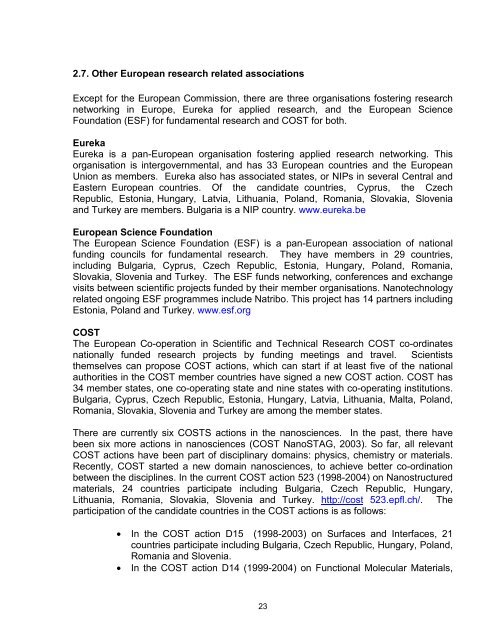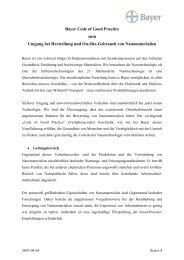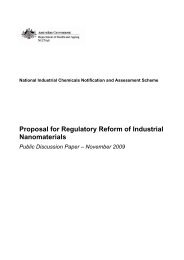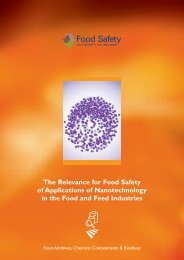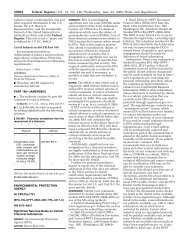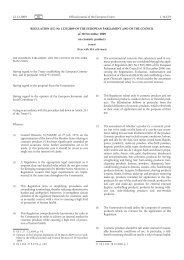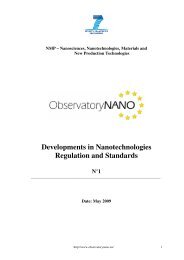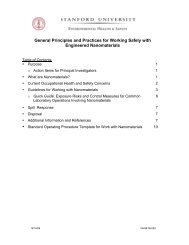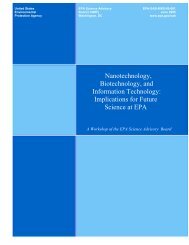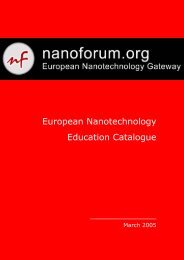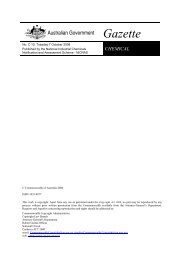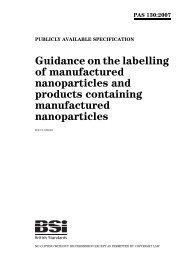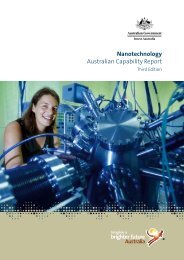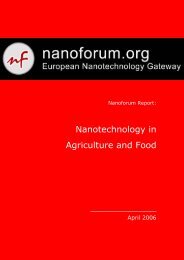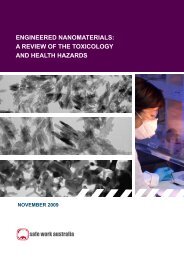Nanoforum - Nanotech Regulatory Document Archive
Nanoforum - Nanotech Regulatory Document Archive
Nanoforum - Nanotech Regulatory Document Archive
Create successful ePaper yourself
Turn your PDF publications into a flip-book with our unique Google optimized e-Paper software.
2.7. Other European research related associations<br />
Except for the European Commission, there are three organisations fostering research<br />
networking in Europe, Eureka for applied research, and the European Science<br />
Foundation (ESF) for fundamental research and COST for both.<br />
Eureka<br />
Eureka is a pan-European organisation fostering applied research networking. This<br />
organisation is intergovernmental, and has 33 European countries and the European<br />
Union as members. Eureka also has associated states, or NIPs in several Central and<br />
Eastern European countries. Of the candidate countries, Cyprus, the Czech<br />
Republic, Estonia, Hungary, Latvia, Lithuania, Poland, Romania, Slovakia, Slovenia<br />
and Turkey are members. Bulgaria is a NIP country. www.eureka.be<br />
European Science Foundation<br />
The European Science Foundation (ESF) is a pan-European association of national<br />
funding councils for fundamental research. They have members in 29 countries,<br />
including Bulgaria, Cyprus, Czech Republic, Estonia, Hungary, Poland, Romania,<br />
Slovakia, Slovenia and Turkey. The ESF funds networking, conferences and exchange<br />
visits between scientific projects funded by their member organisations. <strong>Nanotech</strong>nology<br />
related ongoing ESF programmes include Natribo. This project has 14 partners including<br />
Estonia, Poland and Turkey. www.esf.org<br />
COST<br />
The European Co-operation in Scientific and Technical Research COST co-ordinates<br />
nationally funded research projects by funding meetings and travel. Scientists<br />
themselves can propose COST actions, which can start if at least five of the national<br />
authorities in the COST member countries have signed a new COST action. COST has<br />
34 member states, one co-operating state and nine states with co-operating institutions.<br />
Bulgaria, Cyprus, Czech Republic, Estonia, Hungary, Latvia, Lithuania, Malta, Poland,<br />
Romania, Slovakia, Slovenia and Turkey are among the member states.<br />
There are currently six COSTS actions in the nanosciences. In the past, there have<br />
been six more actions in nanosciences (COST NanoSTAG, 2003). So far, all relevant<br />
COST actions have been part of disciplinary domains: physics, chemistry or materials.<br />
Recently, COST started a new domain nanosciences, to achieve better co-ordination<br />
between the disciplines. In the current COST action 523 (1998-2004) on Nanostructured<br />
materials, 24 countries participate including Bulgaria, Czech Republic, Hungary,<br />
Lithuania, Romania, Slovakia, Slovenia and Turkey. http://cost 523.epfl.ch/. The<br />
participation of the candidate countries in the COST actions is as follows:<br />
• In the COST action D15 (1998-2003) on Surfaces and Interfaces, 21<br />
countries participate including Bulgaria, Czech Republic, Hungary, Poland,<br />
Romania and Slovenia.<br />
• In the COST action D14 (1999-2004) on Functional Molecular Materials,<br />
23


